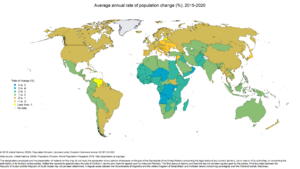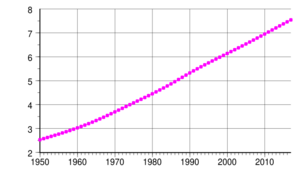Overpopulation facts for kids
Overpopulation means that there are too many living things in one place. Imagine a small pond with only enough food for 10 fish. If 100 fish try to live there, that's overpopulation! It means the number of organisms is bigger than what the area can support for a long time without getting damaged.
Most often, when people talk about overpopulation, they mean the number of humans living on Earth.
Contents
Why Human Population Grew So Much
The world's human population has grown a lot in the last 50 years. The main reason is that fewer people are dying, especially babies and young children. This means more people live long enough to have their own children.
How Death Rates Decreased
Many things helped reduce the number of deaths:
- Fighting diseases:
- We use antibiotics to fight sickness caused by bacteria.
- More people get vaccinations to protect against viral diseases.
- We have better sewage systems and cleaner water. This helps stop the spread of diseases caused by parasites.
- More food production:
A scientist named Steve Jones from University College London once said that humans are "10,000 times more common than we should be" compared to other animals. He explained that we have farming to thank for this. Without farming, the world's population would likely be much smaller.
Earth's Carrying Capacity
The fast growth of the human population over the past 200 years has made people worry. They wonder if Earth can keep supporting so many people. The population has been growing since the Black Death ended around the year 1400.
By the early 1800s, there were about 1,000,000,000 (one billion) people. After World War II, the population grew even faster. By 1960, it reached 3 billion. In just 40 more years, it doubled to 6 billion. In 2011, there were about 6.9 billion people. By 2014, it was over seven billion.
Scientists now expect the population growth to slow down. They think the world population will reach between 8 and 10.5 billion people by the years 2040 to 2050.
Impact on the Environment
Many scientists agree that our current population growth and how we use resources are a threat to the ecosystem. A group of scientists called the InterAcademy Panel said that the growth in human numbers is "unprecedented." They also stated that many environmental problems are made worse by population growth. These problems include:
- Rising levels of atmospheric carbon dioxide (a gas that traps heat).
- Global warming (the Earth getting hotter).
- Pollution (harmful things in our air, water, and land).
When they said this, the world population was 5.5 billion. They thought it might reach 7.8 billion by 2050. But current estimates show we will reach that number much sooner, around 2030.
Finding Solutions
Many experts suggest that better education can help. They also recommend sharing more information about planning pregnancies. A lot of pregnancies (about 40%) are not planned or wanted.
However, there are strong reasons why population control is difficult. Some religious and traditional beliefs encourage large families. Also, very few governments are seriously working on this issue.
See also
 In Spanish: Sobrepoblación para niños
In Spanish: Sobrepoblación para niños
Images for kids
-
Many people use bikes in Ho Chi Minh City, Vietnam.





